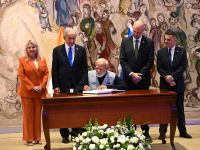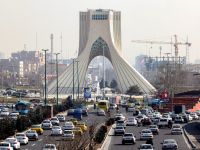Egypt's Pope Tawadros II, Patriarch of the Coptic Orthodox Church, declined an invitation by President Mahmoud Abbas to visit Ramallah Saturday, saying he will not enter "Palestinian land" unless accompanied by the Grand Sheikh of Al-Azhar, the highest seat of Sunni Islam.
In a controversial trip, Pope Tawadros II is currently in Jerusalem, where he led funeral prayers for Metropolitan Archbishop Abraham of Jerusalem and the Near East, who passed away on Wednesday.
The Pope received a call today from Palestinian Authority President Abbas, who invited him to visit Ramallah in the West Bank. Pope Tawadros II "thanked him for the invitation and apologised," according to a statement by the church to state news agency MENA.
In his speech at the funeral of Archbishop Abraham's, the Pope said "it was the duty of the church to partake in the prayer ... and that I be with them to bid him his final farewell here in Jerusalem," according to a video posted on the church's website.
He added that he does not consider being in Jerusalem an official "visit", which one prepares ahead for and for which a schedule is set up. "I consider this a humane duty."
Some reactions
Pope Tawadros' presence in Jerusalem was the subject of heavy criticism on social media and by Egyptian public figures. This is the first such trip since a decision by the Holy Synod in 1980 banned Copts from visiting Jerusalem, the disputed city that is home to ancient holy sites for Muslims, Christians and Jews.
Revolutionary Socialist lawyer Haytham Mohamedein said on his Facebook page that the Pope is leading the church to play the "dirtiest role" in supporting President Abdel Fattah al-Sisi's regime.
Palestinian-Egyptian national, who preferred to remain anonymous, said that she was not expecting the visit. "Pope Shenouda III never wanted to visit Jerusalem as long as the Israelis are in control," she said, referring to Pope Tawadros II's predecessor who led the Coptic church for more than four decades.
An Egyptian Protestant in her early 20s who also preferred to remain anonymous, told Aswat Masriya she "did not like the visit." She highlighted, however, that different Egyptian Christian sects may feel differently about the matter, noting that she believes that Coptic Christians do not perceive Israel to be "the enemy" as much as Muslims do, and that they "do not share the same passion about the cause."
Since Pope Tawadros II is in Jerusalem for Archbishop Abraham's funeral, she believes that at least on the surface there is no political statement behind it.
But given the context of what is happening between Egypt and Israel, she believes it is possible that there is a political reason behind the trip.
But the visit also has its supporters, especially among many who were not in favour of the ban on Copts to visit Jerusalem, a decision that has stopped many from embarking on important Coptic pilgrimage.
In an article on Nov. 27 by Samuel Tadros, a senior fellow at the Hudson Institute’s Center for Religious Freedom, published U.S. Magazine The Weekly Standard's blog, Tadros said that Pope Shenouda's "decision was purely political."
"No matter what his [Tawadros] calculus might have been, there is no turning back now. Next April when it is time for pilgrimage, thousands of Copts will make the journey no matter what the Church says officially," he said.
Pope Tawadros II took office in November 2012, and despite his merely three-year papacy, this is not his first controversial visit.
He visited the Vatican in 2013, marking the first trip by an Egyptian Pope to the Roman Catholic Church in 40 years. The two churches do not agree on the nature of Jesus, a dispute that dates back to the year 451 A.D.
During Pope Shenouda III's papacy, Copts who went for pilgrimage to Jerusalem had to issue an apology in newspapers to be allowed to receive communion. According to state run newspaper Al-Ahram, there was an increase in the number of Coptic pilgrims to the holy city in 2015.
In an interview that he gave to Al-Ahram in December 2014, Pope Tawadros said there is no "going back on the Holy Synod's decision to ban Copts from visiting Jerusalem except with their Muslim brothers."
He added, however, that the elderly are exempt from this rule for humane reasons.
"Do not forget that we have a bishop in Jerusalem, Coptic churches, monks and nuns and a Coptic school," he said.
Egypt-Israeli ties and the normalization issue
Egypt was the first Arab country to recognise the Jewish state, but tensions between the two countries still exist.
Egypt has an ambassador in Israel but agreements between the two states, whether political or trade deals have often triggered strong opposition inside Egypt. The Egyptian decision to export gas to Israel in the late years of former president Hosni Mubarak, who was ousted in a 2011 uprising, was one of the most inflammatory issues during the protests.
The most recent incident was when Egypt voted for Israel's membership in the United Nation's Committee on the Peaceful Uses of Outer Space in October.
Reacting to the strong criticism, Egypt explained that it was inevitable because the vote also included three Gulf Countries, which Egypt wished to support. However, other Arab countries including Saudi Arabia had abstained.
In September 2011, Egyptian protesters attacked the Israeli embassy in Cairo's twin city Giza, with some storming the building that housed the embassy. The staff had to be evacuated for safety concerns.
The Arab-Israeli conflict dates back to the early 20th century and has seen Israel engage in direct wars with several Arab countries over the past century. In 1967, Israel expanded its territory inside Palestine and seized territory in Syria, Lebanon and Egypt.
In 1973, Egypt and Syria launched simultaneous operations to reclaim the occupied territories in their countries.
The fighting paved the way for talks between Egypt and Israel, who signed a peace treaty in 1979 after months of negotiations, ending a state of war and officially normalising ties.
Egypt's position calls for the creation of a Palestinian state based on the 1967 borders, with east Jerusalem as its capital. Cairo has typically been involved as a mediator in peace talks between Israeli and Palestinian officials.
By Hend Kortam








